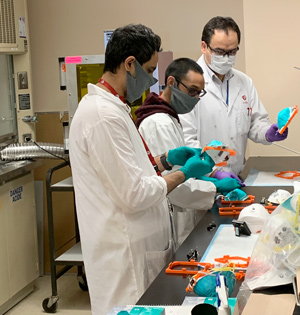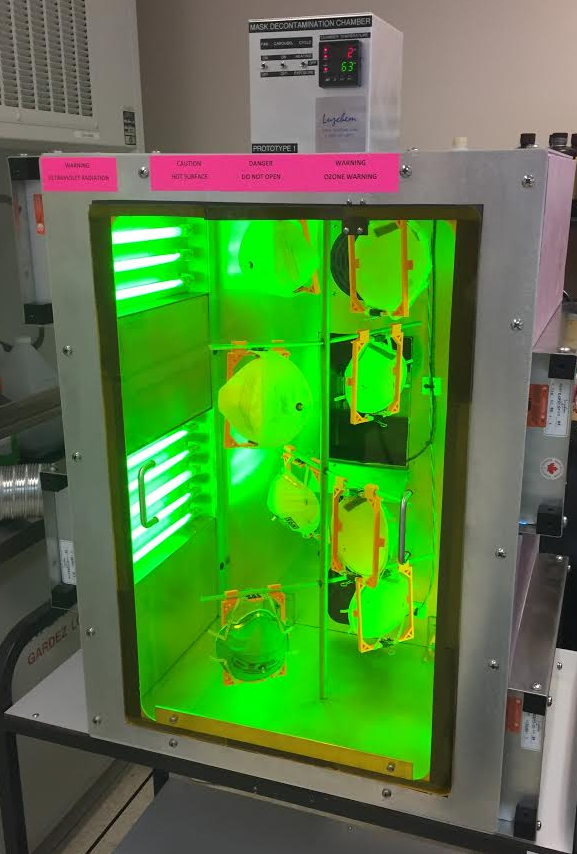Our editorial team is working from home to bring you a series of articles about the coronavirus. This article, about a breakthrough innovation that can decontaminate used surgical masks, is the first in the series.
N95 surgical face masks are an example of personal protective equipment used to protect frontline healthcare workers from the spread of COVID-19. The need for the masks has soared recently, and companies around the world are ramping up their production efforts to meet the growing demand. For these companies, and for scientists on all continents, it’s a race against time to control the disease.
Scientists at the University of Ottawa Heart Institute (UOHI), working in partnership with teams at Luzchem Research Inc., and with advice from Professor Tito Scaiano in the Faculty of Science at the University of Ottawa, are “shining light” (both figuratively and literally) on the problem.

Dr. Emilio Alarcon is a scientist in the Division of Cardiac Surgery and Bio-Engineering and Therapeutic Solutions (BEaTS) Laboratory at the UOHI and an assistant professor in the Department of Biochemistry, Microbiology and Immunology at the University of Ottawa. Alarcon and a multidisciplinary team, including an energetic group of trainees, are developing a process that combines temperature and light to effectively “clean” used (and potentially contaminated) masks. The project is funded by an NSERC Alliance COVID-19 grant, established by the Natural Sciences and Engineering Research Council to leverage the expertise of Canadian researchers and their partners to address the unprecedented coronavirus crisis.
“It’s a contained system, almost like a tanning bed,” says Dr. Alarcon. “After use, the contaminated masks are treated in a custom chamber, where they are exposed to a photothermal treatment that safely removes any harmful microbes on the mask that could cause an infection.”
Alarcon says the technology could soon enable healthcare workers across the country to reuse their mask a second or even a third time without compromising their health and safety – or that of the patient for which they are providing care.
We are essentially working to double, even triple the number of masks available to the Canadian healthcare system.
- Dr. Emilio Alarcon
“We are essentially working to double, even triple the number of masks available to the Canadian healthcare system,” says Alarcon. “This technology could be expanded to the decontamination and reuse of other PPE such as surgical masks and face shields.”
“This is a fragile time for science,” he adds. “It’s easy and natural to feel frustrated in these uncertain times. For those who can, there is a calling – a duty we share as scientists – to push ourselves, to challenge our concept of what is possible. This is what it means to me to be a scientist.”

The device has demonstrated effective for bacteria and virus eradication, a patent filed and pending approval from Health Canada. Alarcon, the BEaTS lab and Luzchem hope to deploy the technology in a matter of weeks. “We are grateful to have received funding from NSERC, without it this work would not be possible,” says Alarcon. “Increased funding and support from our government and our generous donors affords us the opportunity to continue our important research to stop the spread of this disease.”
COVID-19 resources
Hospitals in cities around the world are moving to cancel or postpone elective surgeries and procedures to prevent the potential spread of the virus. Patients, too, are turning to telehealth alternatives for treatment or advice, avoiding hospitals for fear of catching COVID-19 or unknowingly passing it on to others themselves. It has been reported that heart attack and stroke patients have all but disappeared, part of an unprecedented shift in the demand for hospital services imposed by the pandemic.
On its website, the University of Ottawa Heart Institute is cautioning all who may experience heart-related symptoms not to delay seeking emergency medical assistance. A delay in seeking care could have a lasting impact on the outcome of your treatment.
Download and share this infographic (PDF) developed by the UOHI, and visit this website for helpful COVID-19 updates and resources, tips to keep safe and healthy during the pandemic, and for answers to your frequently asked questions about the virus’s implications on your heart health.
Together, we can BEAT this virus.


